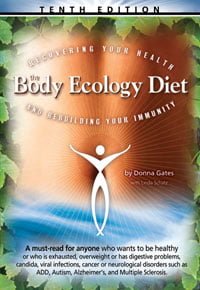
Your go-to review of Body Ecology’s 7 Principles for healthy eating
When it’s time to make big changes, we often put health at the top of the list. It’s easy to forget to focus on the importance of eating foods that are healthy and boosting energy, vitality, and immunity.
Beyond just incorporating healthy foods, the Body Ecology System of Health and Healing supersedes diet and nutrition programs by providing a roadmap to your optimal health and longevity.
“Body Ecology emphasizes the importance of what we put into our bodies and teaches a way of eating that makes me feel like I am in control of my health and in tune with my body’s intuitive needs. Cultured vegetables and coconut kefir have become essentials, not only in my home, but whenever I travel.”
– Jessica Biel
Read more about The Body Ecology Diet and the 7 Principles here.
Energy, vitality, and longevity can be attained at any age, and with Body Ecology’s 7 Principles, you can achieve your goals — and a lifetime — of looking and feeling your best. Healthy eating, along with balancing the microbiome, doesn’t have to be difficult.
Is it time to get your inner ecology back on track?
The Body Ecology program will help you establish the “missing piece.” The inner ecosystem, which is key to your health.
We know that the stress of modern living, the Standard American Diet (SAD) of processed foods and too much sugar, and an over-dependence on drugs and antibiotics may weaken immunity.1,2
Beneficial bacteria (also known as microbes) digest the foods you’re eating. A lifestyle that includes stress and poor eating habits kills the beneficial microscopic “good guys” that keep you healthy, possibly setting the stage for disease.3
Stress and junk foods may cause digestive upset. As a result, digestive pain, bloating, and/or fatigue after eating may ensue.
While you may be encouraged to try popular drugs to solve these problems, we have some alternate suggestions that won’t include putting a Band-Aid on the underlying issue.
The Body Ecology System of Health and Healing guides you in using fermented foods and drinks to repopulate your digestive system with the beneficial bacteria needed to help digest food, assimilate nutrients, and enhance immunity.
Countless people have told their stories about how Body Ecology has changed their life for the better. Listen to what they have to say.
Body Ecology’s 7 Principles: To help restore health, start here
Donna Gates spent years researching both the ancient and the most current systems of nutrition and healing to create a program that includes the wisdom of each yet surpasses them all. Recognizing that everything has a front and a back — or a positive and a negative — Body Ecology takes the positive from many healing disciplines and finds solutions for the negatives.
The 7 Healing Principles are a result of this work, and the highlights are outlined here:
1. The Principle of Balance.
- The Principle of Balance is based on the concept of yin and yang, the opposing energy forces from ancient Chinese and Japanese traditions. Everything in the world has some properties of yin and yang but in varying proportions.
- Yin energy is light, expansive, wet, soft, cold, and more vegetal. Yang energy is heavy, contracting, dry, hard, hot, and more animal. Body Ecology uses the terms “expansion” and “contraction” to explain the yin and yang energy of the food you eat.
- Some foods, like sugar and alcohol, are way too expansive for your body. Your bloodstream quickly absorbs sugar and produces energy, making you feel temporarily open and relaxed, yet these foods are damaging because they’re not balanced.
- Other foods, like excessive and poor-quality salt and animal products, are more contracting and cause your cells to contract and lose fluids, making you feel tight and constricted.
Your body is always seeking balance. If you eat too much salt, your body becomes too contractive, and you may quickly find yourself craving something sweet. Without understanding this principle, you may unknowingly create imbalance in a vicious cycle of cravings.
2. The Principle of Acid and Alkaline.
- To maintain health, your blood must be slightly alkaline. The foods you eat and the lifestyle choices you make impact your body’s ability to maintain that alkaline state.
- Foods can be alkaline, acidic, or neutral in your body. Your goal would be to have a balance of alkaline and acidic foods so that you can maintain the alkaline state of your blood.
- If you get out of balance and your blood becomes too acidic, you may become more susceptible to illness and disease.4 At the same time, lifestyle choices like stress, taking prescription drugs, and not getting enough sleep may potentially create acidic blood.5
Paying attention to a balanced lifestyle is also key to your health and longevity.
3. The Principle of Uniqueness.
- As humans, we share so many similarities with one another, but your body is unique.
- Each of us is an experiment of one, and for that reason, you may need to modify certain elements of any diet or lifestyle to suit your own individuality.
While the Body Ecology lifestyle recommends a specific protocol for restoring balance in your body, any time you try a new way of eating, it’s vital to observe your body’s reactions and assess whether this new path is bringing you back toward balance.
4. The Principle of Cleansing.
- Did you know your body cleanses every day? Through elimination, urine, tears, and sweat, your body rids itself of toxins that would otherwise build up and may contribute to sickness and disease.
- Fevers, colds, and skin eruptions may actually be a natural part of the cleansing process and shouldn’t be suppressed. Cleansing allows your body to restore balance and occurs when imbalance is too great and threatens life.
- As you start on the Body Ecology program, you’ll experience the symptoms of cleansing, and you might feel worse than you feel now. Hang in there — it’s your body’s way of getting rid of the bad and making room for the good.
After all, you cannot help heal your current condition without cleansing.
5. The Principle of Food Combining.
- The Body Ecology lifestyle teaches that combining certain foods when you eat can either help or hinder your digestion. If you combine the wrong foods, your body may actually secrete enzymes that cancel each other out.
- This leads to slowed or impaired digestion, causing food to potentially ferment in your stomach or toxins to be released in your intestines. These conditions make your body more attractive to pathogens.
This is a highly useful principle to help improve your health — and often one of the most misunderstood. For a more in-depth look at this principle and all the others, be sure to read The Body Ecology Diet.
6. The Principle of 80/20.
This principle has two concepts that aid your digestion:
- Quantity — Overeating severely weakens your digestive system. Give your stomach room to digest your food by only filling it to 80 percent of capacity and leaving 20 percent empty to help your body digest.
- Balance of nutrients – Likewise, 80 percent of every meal should be land and ocean vegetables. The other 20 percent should be either a protein or a grain.
7. The Principle of Step-by-Step.
- Just as it takes time to get out of balance, it also takes time to rebuild your health. You cannot expect instant healing, but making small, consistent changes gives your body the foundation it needs to support optimal, long-term health.
- Starting any new program is about creating new habits. It takes time and effort, which can sometimes feel hard.
- The key is to take everything step-by-step. Incorporate one healing principle (or even one element of a healing principle) at a time so that you don’t feel overwhelmed.
Take care of yourself by going at the pace that feels right to you.
REFERENCES:
- 1. Anette Christ, Patrick Günther, Mario A.R. Lauterbach, Peter Duewell, Debjani Biswas, Karin Pelka, Claus J. Scholz, Marije Oosting, Kristian Haendler, Kevin Baßler, Kathrin Klee, Jonas Schulte-Schrepping, Thomas Ulas, Simone J.C.F.M. Moorlag, Vinod Kumar, Min Hi Park, Leo A.B. Joosten, Laszlo A. Groh, Niels P. Riksen, Terje Espevik, Andreas Schlitzer, Yang Li, Michael L. Fitzgerald, Mihai G. Netea, Joachim L. Schultze, Eicke Latz. Western Diet Triggers NLRP3-Dependent Innate Immune Reprogramming. Cell, 2018; 172 (1-2): 162 DOI: 10.1016/j.cell.2017.12.013.
- 2. Konrad C. Bradley, Katja Finsterbusch, Daniel Schnepf, Stefania Crotta, Miriam Llorian, Sophia Davidson, Serge Y. Fuchs, Peter Staeheli, Andreas Wack. Microbiota-Driven Tonic Interferon Signals in Lung Stromal Cells Protect from Influenza Virus Infection. Cell Reports, 2019; 28 (1): 245 DOI: 10.1016/j.celrep.2019.05.105.
- 3. Benoit Chassaing, Omry Koren, Julia K. Goodrich, Angela C. Poole, Shanthi Srinivasan, Ruth E. Ley, Andrew T. Gewirtz. Dietary emulsifiers impact the mouse gut microbiota promoting colitis and metabolic syndrome. Nature, 2015; DOI: 10.1038/nature14232.
- 4. Wu T, Seaver P, Lemus H, Hollenbach K, Wang E, Pierce JP. Associations between Dietary Acid Load and Biomarkers of Inflammation and Hyperglycemia in Breast Cancer Survivors. Nutrients. 2019;11(8):1913. Published 2019 Aug 15. doi:10.3390/nu11081913.
- 5. Smith ZR, Horng M, Rech MA. Medication-Induced Hyperlactatemia and Lactic Acidosis: A Systematic Review of the Literature. Pharmacotherapy. 2019 Sep;39(9):946-963. doi: 10.1002/phar.2316. Epub 2019 Aug 29. PMID: 31361914.









